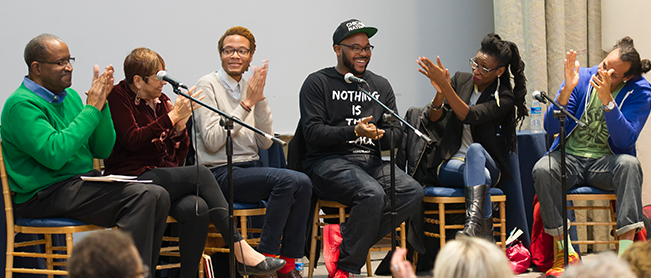A successful event and a meaningful conversation that is just beginning
A successful event and a meaningful conversation that is just beginning
“I found myself enraptured at every moment, and it was incredible to see such a packed house for poetry. Thank you all for gathering these authors all together in one place for such an important conversation.”
–Rachel Mennies Goodmanson, attendee“We reached a huge number of people with a really meaningful discussion, with our authors representing the very best of what their work, and the efforts of this Press, can do on a matter of the greatest public significance. It is our natural role as publishers to bring the ideas of our authors to the widest possible audience; and as satisfying as doing that every day with our books is, it was manifest last night in an entirely different and impactful way.”
–Peter Kracht, University of Pittsburgh Press Director
Last night, the much anticipated “Poetry and Race in America” reading and discussion took place in the Frick Fine Arts Auditorium at the University of Pittsburgh in Pittsburgh, PA. The auditorium quickly filled to max capacity, with an audience eagerly awaiting a critical discussion with six acclaimed African American poets from the Pitt Poetry Series.
As the audience waited for the evening to begin, the publicity poster (designed by Greta Polo, Design/Marketing) projected on the wall with an ambiguous image of black man with his hands behind his head, set the stage for the complexity of the topic at hand. The sense that something really important was about to take place was palpable when Terrance Hayes, Toi Derricotte, Ross Gay, Rickey Laurentiis, Nate Marshall, Lyrae Van Clief-Stefanon, and Afaa Michael Weaver took their seats onstage.
Max King, president of the Pittsburgh Foundation began by honoring Ed Ochester, editor of Pitt Poetry Series, for his indispensable contribution to poetry. “He has a special ability to find and develop new and diverse voices in poetry. For instance, 38 years before ‘black lives matter’ became a national catchphrase, Ed recognized that black voices, black artists, and black lives mattered in the literary arts.” King announced the creation of the Ed Ochester Lectureship in Poetry and Poetics at the Center for African American Poetry and Poetics at the University of Pittsburgh, offering financial support from an anonymous donor and allowing poets to come to Pitt at least once a year to lecture and discuss their craft.
The poets read some relevant poems, speaking of DNA, black shame, placentas as fertilizer, grandmothers, and Malcolm X. Spanning three generations of poets with unique vantage points, the poems were incredibly diverse and equally powerful. There was a perceivable comradery among the poets on stage, not only from the unifying thread of their individual experiences, but also of pride to be sharing the stage with so much literary talent.
The moderated discussions began by Hayes asking the poets, “why are we still having this discussion about race?” Photographs of the black experience in America were projected behind the poets, reminding us of Sandra Bland, Hurricane Katrina, President Obama, protests, riots, and lynchings. Marshall began by saying that we just haven’t had enough of these discussions yet, and he sees his poetry as a way to bridge communities in a dialogue that might not be possible otherwise.
As the discussions continued, each poet described their response to being black in America. Weaver took the stance that while being African-American is an imposition, how to respond is completely a personal choice. Van Clief-Stefanon described her absolute responsibility to write about social issues, about DNA, about the experience that is uniquely hers as a black woman that is more complex than the box society wants to put her in. Laurentiis spoke of how he treats his darker feelings with curiosity, even exploring how the violence against black people impacts his internal landscape.
Gay captivated the audience when he said “suffering is an aspect of my life but I have also been loved. I feel an ethical requirement to sing the fullness of my life.” Derricote, cofounder of Cave Canem, focused on the fact that now there is a place for black poets to be heard, to have conversations, and not feel as though they have to hide.
One was left feeling that amongst the violence and the injustice, there was still a sense of pride, of hope, and maybe even celebration. But it was very clear as the night grew to a close that the conversation had only just begun and there is still a lot of work to be done. Many attendees left with three or four new poetry books in hand, showing that they were hungry to dive deeper.
Thank you to all of the poets, Pitt’s Center for African American Poetry and Poetics, University of Pittsburgh Press staff, and the audience for making this a truly memorable event.


COMMENTS